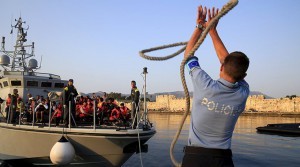The European Commission is today adopting an important set of measures to manage the EU’s external borders and protect our Schengen area without internal borders. Today’s proposals will help to manage migration more effectively, improve the internal security of the European Union, and safeguard the principle of free movement of persons. The Commission is proposing to establish a European Border and Coast Guard to ensure a strong and shared management of the external borders. To further increase security for Europe’s citizens, the Commission is also proposing to introduce systematic checks against relevant databases for all people entering or exiting the Schengen area.
The European Border and Coast Guard will bring together a European Border and Coast Guard Agency built from Frontex and the Member States’ authorities responsible for border management, who will continue to exercise the day-to-day management of the external border.
The new European Border and Coast Guard will have:
- A rapid reserve pool ofborder guards and technical equipment: The Agency will be able to draw on at least 1,500 experts that can be deployed in under 3 days. For the first time the Agency will be able to acquire equipment itself and to draw on a pool of technical equipment provided by the Member States. There will no longer be shortages of staff or equipment for European border operations. The new Agency’s human resources will more than double that of Frontex, to reach 1,000 permanent staff, including field operatives, by 2020.
- A monitoring and supervisory role:A monitoring and risk analysis centre will be established to monitor migratory flows towards and within the European Union and to carry out risk analysis and mandatory vulnerability assessments to identify and address weak spots. Liaison officers will be seconded to Member States to ensure presence on the ground where the borders are at risk. The Agency will be able to assess the operational capacity, technical equipment and resources of Member States to face challenges at their external borders and require Member States to take measures to address the situation within a set time-limit in case of vulnerabilities.
- The right to intervene:Member States can request joint operations and rapid border interventions, and deployment of the European Border and Coast Guard Teams to support these.Where deficiencies persist or where a Member State is under significant migratory pressure putting in peril the Schengen areaand national action is not forthcoming or not enough, the Commission will be able to adopt animplementing decision determining that the situation at a particular section of the external borders requires urgent action at European level.This will allow the Agency to step in and deploy European Border and Coast Guard Teams to ensure that action is taken on the ground even when a Member State is unable or unwilling to take the necessary measures.
- Coast Guard surveillance:National coastguards will be part of the European Border and Coast Guard to the extent that they carry out border control tasks. The mandates of the European Fisheries Control Agency and the European Maritime Safety Agency will be aligned to the new European Border and Coast Guard. The three Agencies will be able to launch joint surveillance operations, for instance by jointly operating Remotely Piloted Aircraft Systems (drones) in the Mediterranean Sea.
- A mandate to work in third countries:The Agency will have a new mandate to send liaison officers to and launch joint operations with neighbouring third countries, including operating on their territory.
- A stronger role in returns:A European Return Office will be established within the Agency to allow for the deployment of European Return Intervention Teams composed of escorts, monitors and return specialists who will work to effectively return illegally staying third country nationals. A standard European travel document for return will ensure a wider acceptance of returnees by third countries.
- Guaranteeing Internal Security: The Agency will include cross-border crime and terrorism in its risk analysisand cooperate with other Union agencies and international organisations on theprevention of terrorism, in full respect of fundamental rights.
To read the full announcement, click here.





